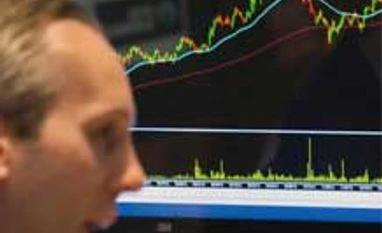A plunge in oil below $60 and the failure of an emergency interest rate rise to stabilise Russia's rouble sent another shock through global financial markets on Tuesday, adding to a growing sense of crisis in a volatile end to 2014.
Moscow's main stock exchanges fell by 5 and 9% respectively and those in Europe's big developed markets fell as much as half a percent in response.
Stock markets in Asia ended lower and the yen, one of investors' last refuges in times of economic stress, rose almost one percent as the rouble lost everything it gained after central bank raised rates 6 1/2 points on Monday.
After a bumper few years driven by the huge quantities of extra cash pumped into the financial sector by the world's central banks, the struggle for growth in Europe and Japan and a slowdown in China has left investors deeply concerned over the shape of things to come.
"It may be that this is just a tremor in Russia and it may be isolated, but it is too early to say," said Neil Mellor, a currency strategist with Bank of New York Mellon in London.
"We always knew that the dollar's rise would send a shock through emerging markets and we can see that is happening."
A downbeat China factory survey had weighed on Asian shares earlier in the session, and surveys of sentiment in Europe's manufacturing and services did little to calm the mood.
Also Read
"While some would have hoped to see disappointing China data result in growing calls for stimulus, this has not been the case today and we've actually seen investor concerns heighten," Melbourne-based IG Markets strategist Stan Shamu said in a note.
"China activity generally ramps up heading into the back end of the year, but it doesn't seem like this will be the case this time."
MSCI's broadest index of Asia-Pacific shares outside Japan fell 0.8%, after major indexes all posted losses on Wall Street on Monday. Japan's Nikkei stock average skidded 2%.
Emerging markets remained under pressure as investors dumped riskier assets. The Indonesian rupiah skidded to a 16-year low.
The Russian central bank early on Tuesday raised its key interest rate to 17% from 10.5%.
Oil and gas are Russia's chief source of export revenue and sanctions set out in a bill passed by US Congress on Saturday have also added to Russia's economic woes.
The rouble traded at 65.30 roubles per dollar after rising above 67.00 at one point on Monday when oil prices fell sharply.
Crude prices fell again, by nearly 3%. Brent crude was under $60 for the first time in more than five years after OPEC said again it would not cut output despite fears of oversupply.
UAE Oil Minister Suhail Bin Mohammed al-Mazroui said there was no need for OPEC to hold an emergency meeting, reinforcing the idea that major Gulf producers are ready to wait out lower prices.
)